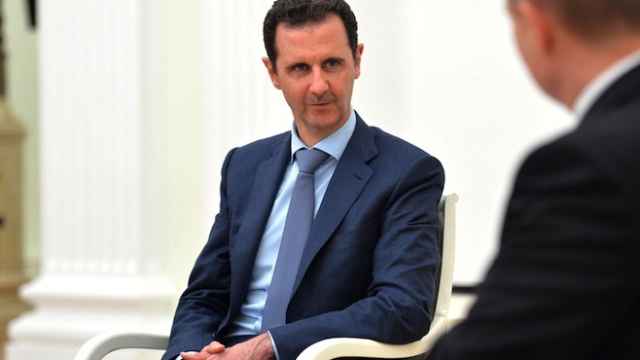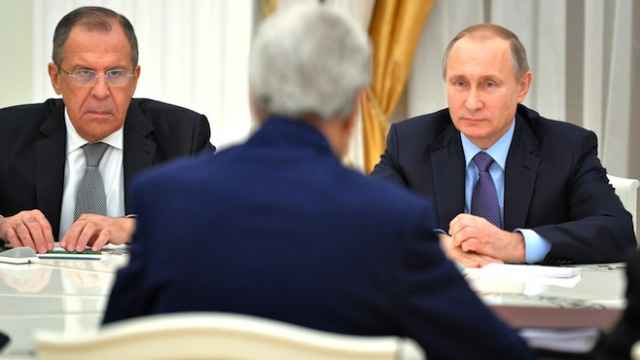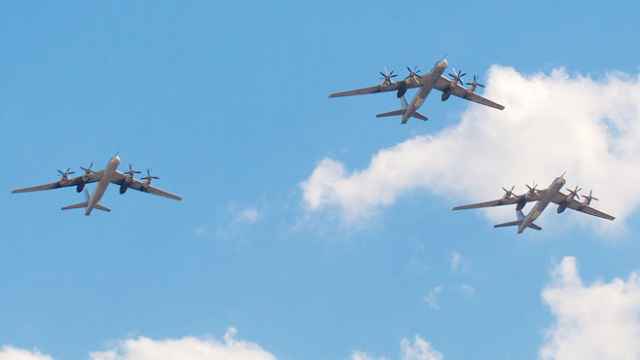"How great is it that our nation is ruled by a man that we can be so proud of?" To be honest, this is a first in my life." This was the praise given to President Vladimir Putin in the wake of his speech before the United Nations General Assembly on Sept. 28 in the Noviye Izvestia newspaper.
The writer was Alexander Kalyagin, a prominent Russian actor and theater director, and a Soviet screen icon, and he continued: "Every word, every pause, every intonation was in place. Having heard [Putin's words], 'Do you understand what you've done,' I couldn't help but applaud."
Kalyagin's lofty appraisal of Putin's General Assembly address — his first in a decade — was symptomatic of a wider trend — across Russia's cultural and political elite, it was an event that marked Russia as a major player in world affairs once again.
The Russian president sought to reinvent himself as the world's newest peacemaker. While hitting on several familiar chords concerning the conflict in Ukraine, the core of Putin's speech focused on presenting Russia's take on the fight against the Islamic State, and proposed an international coalition with the Syrian government to stop the extremist group's rise. The Islamic State is a terrorist group banned in Russia.
"We think it is an enormous mistake to refuse to cooperate with the Syrian government and its armed forces, who are valiantly fighting terrorism face-to-face," Putin said. "We should finally acknowledge that no one but President [Bashar] Assad's armed forces and [Kurdish] militias are truly fighting the Islamic State and other terrorist organizations in Syria."
The remarks were part of a three-front campaign waged by Putin from mid- to late-2015 to divert international and domestic attention away from Ukraine toward Syria, where Russia has the diplomatic clout to make itself useful to the West in the Middle East — thereby giving Moscow leverage to break economic sanctions, as the conventional wisdom goes.
Having been eagerly accepted at home, Putin's pivot met mixed results abroad, where the Kremlin's diplomatic and military push in Syria has seen the regime of its ally Assad spared from imminent collapse, and diplomatic isolation from the West apparently ended — but no concessions on sanctions are in sight.
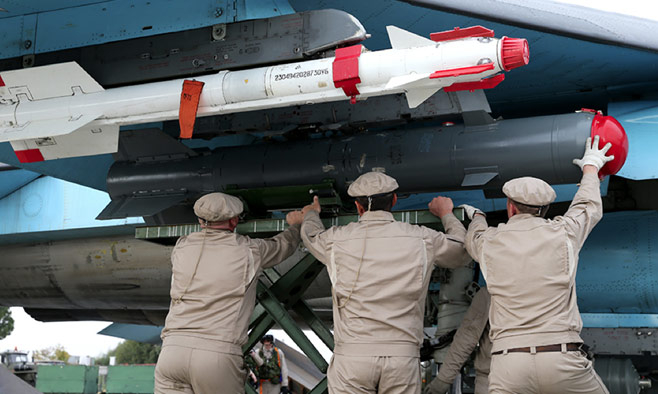
Russian military technicians equipping a plane for a mission at the Russian Khmeimim airbase near Latakia, Syria.
A Wild Year
Putin started 2015 with a relatively strong hand. A major rebel offensive in January on Ukrainian government forces holding onto the town of Debaltseve in eastern Ukraine resulted in Kiev forces ceding the area to pro-Russian forces. He was assumed to be calling the shots at peace talks in Minsk on Feb. 11, where the sides finally agreed to cease fire under the supervision of German Chancellor Angela Merkel and French President Francois Hollande.
But as the year dragged on, Putin found himself in an increasingly difficult position. By mid-summer, Ukrainian forces had recaptured Debaltseve, and Western sanctions against Russia for its actions in Ukraine and attempts to diplomatically isolate Moscow were taking a toll.
Despite the officially defiant rhetoric coming out of the Russian capital, economic sanctions imposed by the EU and U.S. in 2014 combined with low global oil prices to deal real damage to the Russian economy.
Putin needed to find a way to change the game and begin normalizing relations with the West on his own terms, and an opportunity began to take shape in early summer 2015, as the Syrian refugee crisis flared to unimaginable levels.
Russia has maintained close ties with President Bashar Assad since the start of the Syrian crisis in 2011, and used its relationship to leverage itself as a sometimes useful partner for the West in that shattered Arab republic — a card he would attempt to play again.
"Call it geopolitical blackmail," said Vladimir Frolov, a prominent Russian international affairs expert. By inserting himself as an unavoidable obstacle to finding a peaceful solution to the 4 ? year-old Syrian civil war, Putin hoped to negotiate and end to economic sanctions.
It was a bold move, and Putin pushed his luck to the limit by executing a risky military and diplomatic effort to trade a solution in Syria for compromises with the West in Ukraine — where the most recent cease fire under the Minsk agreement appears to be holding.
In doing so, Putin hoped to break his diplomatic isolation imposed during the crisis in Ukraine. But there was also a matter of domestic political necessity, as the now-frozen Donbass conflict was used domestically as a driver of favorable public opinion.
"They also wanted to steer the conversation away from Ukraine [to] give the Kremlin some breathing space to wind down the war in the Donbass," Frolov said, a move which entailed a serious media blitz painting Islamic radicals in Syria as Russia's number one enemy after more than a year of rhetorical blasts at alleged neo-fascists sitting in power in Kiev.
The move succeeded in certain aspects, but failed in others. Though the U.S. and Russia have been conducting high-level talks on finding a resolution in Syria since at least May — in a sense ending diplomatic isolation — the West has yet to budge on sanctions or Ukraine.
Meanwhile, Putin has tied his nation to the fate of the embattled Assad regime, perhaps portending to a drawn out Russian military involvement in the region if peace is not forthcoming in the next year. Russia's campaign was set to last just a few months, but last week Putin signaled Russia would remain involved for the long-haul.
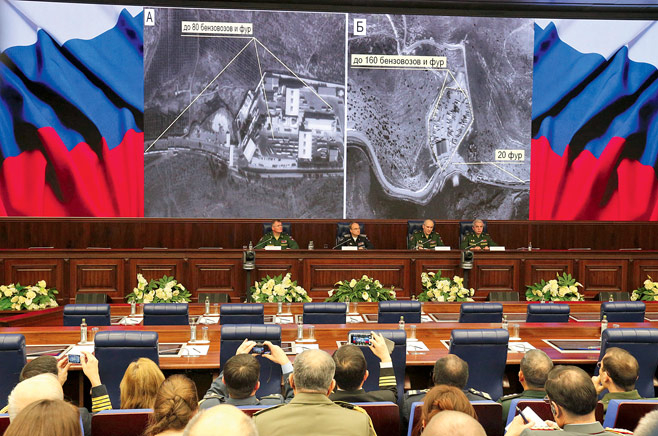
Russian defence ministry officials sit under screens with satellite images on display during a briefing on the Turkish shoot-down of a Russian fighter plane.
Engineering the Pivot
The administration of U.S. President Barack Obama has repeatedly shown a willingness to sit down and talk with the Russians as relations soured, and this tendency has applied particularly to Syria — such as in 2013 when Russia was called upon to destroy Assad's chemical weapons.
But things had become more antagonistic between East and West since then. The Kremlin, according to Western officials, was blatantly supporting pro-Russian troops in eastern Ukraine — a fact Putin essentially admitted to last week — and was disingenuous about peace in Ukraine.
Opportunities to come together against terrorism in early 2015, after a terror attack on the offices of French satire journal Charlie Hebdo shocked the West, were largely squandered by the conflict in Ukraine and the habit of hostile rhetoric cast by both sides.
Efforts to iron out these issues and conduct more serious talks on the situation in Syria, the Islamic State, and possible coordination in finding a peaceful settlement to the conflict began as early as May, when Putin approached the U.S. to begin feeling out his opportunities to again leverage his favor with Assad to strike some deal with the West that would see Russia's position on the international stage elevated, his standing at home shored up, and sanctions lifted.
But the West's concern with the situation in Ukraine — its insistence that a new cease fire must be signed and implemented before serious conversations on Ukraine could be had, and sanctions could be lifted — remained a sticking point.
Bolder action was needed, and Putin made his move in earnest in September. At the beginning of the month, a new Minsk cease fire agreement was signed between Kiev and pro-Russian rebels in the Donbass. Though shaky at times, the agreement continues to hold.
With Ukraine apparently frozen, Putin used the UNGA as his platform to launch a rhetorical shift from Ukraine to Syria, as well as to secure a private audience with Obama to reportedly discuss cooperation in Syria, as well as the situation in Ukraine.
As this was going on, reports began circling the Russian and international media that the Defense Ministry was moving weapons, equipment, aircraft and support personnel into Syria via airlifts and sea shipments — foreshadowing its open intervention in the conflict.
Breaking Isolation
After a 90-minute meeting held behind closed doors at the United Nations at the end of September, in which Putin said the two world leaders discussed increasing bilateral cooperation against the Islamic State, officials in Washington were ready to listen.
A senior administration official, speaking to the Wall Street Journal in the wake of the meeting — the first official meeting in over two years — said that Obama walked way with a greater understanding of Putin's intentions in Syria, believing them to be fighting the Islamic State.
But it was an illusion that did not last, and this is where Putin overplayed his hand. Within a day or so of Russia's open intervention in the Syrian civil war on Sept. 30, officials from capitals throughout the West felt they had been lied to — Russia was there to save Assad, not to fight the Islamic State.
The U.S. and its Western allies that are bombing Islamic State targets in Syria quickly retrenched and fielded a new party line in the face of Putin's final play of 2015: the door is open for cooperation with Russia in Syria if it plays a constructive role in Assad's departure.
The two sides have so far only managed to hash out an agreement on safely operating in Syrian air space, despite their different and sometimes opposing missions. This is where the two sides have seen most regular communication.
Overall, engagement between the two sides has therefore been compartmentalized in several ways: Ukraine and Syria are separate issues; talks are being held on broad issues as the senior level; and coordination in Syria handled by military commanders in theater.
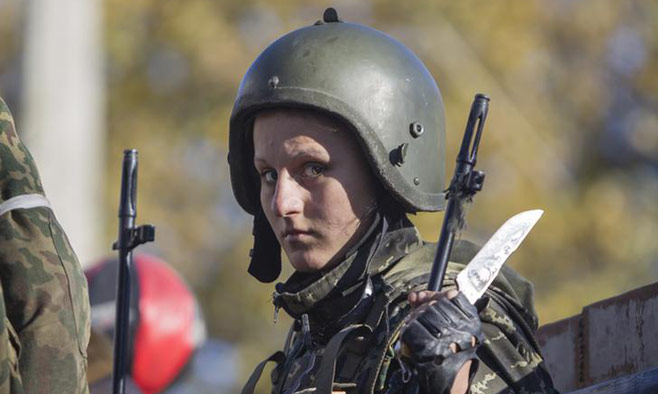
A female pro-Russian rebel stands on a truck as she gets ready to take position near the Sergey Prokofiev International Airport during fighting with Ukrainian government forces.
Quagmire
While Putin appears to have won the public relations pivot at home, and made considerable progress in ending Russia's diplomatic isolation, his military adventure in Syria has not yielded the speedy results the Kremlin anticipated — slowing additional diplomatic efforts.
"The initial Moscow plan was to gain fast success in Syria and to guarantee a strong position for initiating an international forum for a peaceful resolution of the conflict," said Vadim Kozyulin, a military expert at the Moscow-based PIR Center think tank.
"It looks like that amount of military success is not sufficient for making the diplomatic stage of the plan successful," Kozyulin said, forcing Russia to dig in deeper to the conflict — the Defense Ministry in recent weeks has gradually deployed new hardware to the fight.
The military efforts have been complicated by the development of the situation on the ground, and the interests of other actors involved in Syria — such as Turkey — who have their own sets of interests in the resolution of the conflict.
For example, Russia's bombing of Turkmen rebels in northwestern Syria likely factored heavily into Ankara's decision last month to shoot down a Russian Su-24 fighter-bomber aircraft, sparking a spat between Russia and Turkey that has further complicated the situation.
At his end-of-year press conference last week, Putin claimed that he was never informed about Turkmen rebels fighting in Northern Syria, but later Turkish President Recep Erdogan said that "I told Mr. Putin myself there was no [Islamic State] presence in Northern Syria, but mostly Turkmen."
The spat with Turkey has been a distraction from Russia's primary goals in Syria, and in the weeks since the downing of the Su-24 fighter-bomber the two sides have been playing rhetorical chicken, each trying to look tougher than the other.
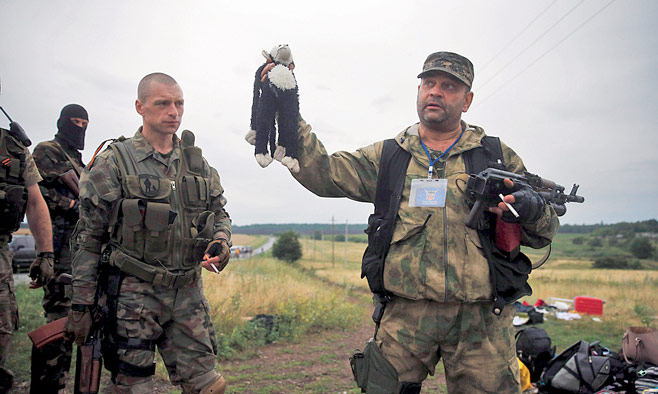
A Seat at the Table
Putin received two boosts from terror attacks since October. The first was the bombing of a Russian airliner on Oct. 31, killing 224 Russian citizens. Then, in November, Paris was rocked by several coordinated terror attacks — all allegedly tracing back to the Islamic State.
This has elevated Western fears of terrorism emanating from Syria, piquing interest in possible cooperation in several Western circles, and given Putin an opportunity to realign his rhetoric with prevailing international attitudes toward the threat of the Islamic State. A Western power — France this time — was officially called an "ally" the first time since the annexation of Crimea.
Contact between Russia and Washington has been restored in several areas after almost two years of relative silence, particularly at the senior level: U.S. Secretary of State John Kerry has visited Moscow twice since May, and Obama has met Putin three times since September.
"I think from this perspective, the plan — despite its chutzpah — worked better than even initially envisioned," said Frolov, though the Islamic State attacks in Paris and Egypt certainly helped Putin's hand on the diplomatic front.
"The plan helped changed the conversation and pierced Russia's diplomatic isolation after Ukraine, and it elevated Russia to a peer-partner to the U.S. and EU in the Middle East. It failed completely, however, to get Russia out of the Ukraine sanctions," he said.
Although the U.S. and EU maintain they are willing "to keep the door open" to cooperation with Russia in Syria, as U.S. Defense Secretary Ash Carter wrote in a piece published by Defense News on Dec. 13, concessions in Ukraine remain off the table.
Putin appears to have underestimated the West's resolve and ability to compartmentalize Syria and Ukraine as two issues, despite Russia's attempts to trade one for the other.
Indications can be found on both sides that positions are softening, but the golden compromise — Assad can remain in power for a set transition period, but must ultimately leave — has yet to materialize as 2015 draws to a close.
Russia may yet be the one to budge first as the consequences of its economic crisis continue to mount. But this hinges on the outcome of upcoming peace talks between the Syrian government and various elements of the Syrian opposition.
As noted by Dr. Karen Dawisha, author of "Putin's Kleptocracy" and scholar of Russian foreign policy in the Middle East, "the Syrian regime has been and will remain a strategic interest and ally of Russia, [but] Russia's loyalty is to the regime, and not to Assad personally."
Meanwhile the West continues to dial up the sanctions heat with regard to Ukraine, and a message appeared to be sent on Dec. 22. Despite progress made on Syria with Russia, the U.S. imposed new sanctions on Russia just after the EU voted — after tarrying in indecision for a little while — to extend its sanctions. And this is the message Vladimir Putin will have to take with him to 2016.
Contact the author at [email protected]
A Message from The Moscow Times:
Dear readers,
We are facing unprecedented challenges. Russia's Prosecutor General's Office has designated The Moscow Times as an "undesirable" organization, criminalizing our work and putting our staff at risk of prosecution. This follows our earlier unjust labeling as a "foreign agent."
These actions are direct attempts to silence independent journalism in Russia. The authorities claim our work "discredits the decisions of the Russian leadership." We see things differently: we strive to provide accurate, unbiased reporting on Russia.
We, the journalists of The Moscow Times, refuse to be silenced. But to continue our work, we need your help.
Your support, no matter how small, makes a world of difference. If you can, please support us monthly starting from just $2. It's quick to set up, and every contribution makes a significant impact.
By supporting The Moscow Times, you're defending open, independent journalism in the face of repression. Thank you for standing with us.
Remind me later.



